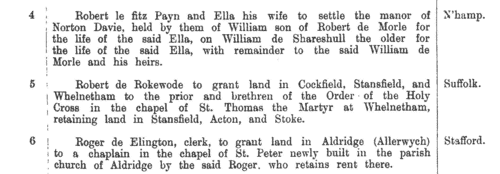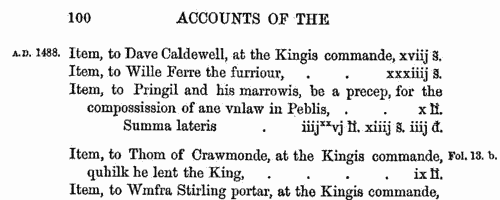Burel Surname Ancestry ResultsOur indexes 1000-1999 include entries for the spelling 'burel'. In the period you have requested, we have the following 54 records (displaying 51 to 54): Single Surname Subscription | | | Buying all 54 results of this search individually would cost £246.00. But you can have free access to all 54 records for a year, to view, to save and print, for £100. Save £146.00. More... |
These sample scans are from the original record. You will get scans of the full pages or articles where the surname you searched for has been found. Your web browser may prevent the sample windows from opening; in this case please change your browser settings to allow pop-up windows from this site. Landowners and tenants in London
(1345-1485)
Inquisitions ad quod damnum were held by the appropriate sheriff or escheator (or other officer in whose bailiwick the matter in question might lie) to investigate cases in which the royal or public interest might be damaged by proposed alienation or settlement of land (especially alienation to religious uses, into mortmain). The key findings from these inquisitions were as to the tenure of the land and the service due from it; its yearly value; the lands remaining to the grantor, and whether they sufficed to discharge all duties and customs due from him; and whether he can still be put upon juries, assizes and recognitions, so that the country be not burdened by his withdrawal from them. Generally speaking, this process had the makings of a system of licensing such alienations, and raising money in proportion to the valuations. Equally, there are many items that deal with subjects such as the closing of public roads, the felling or inclosing of woods, or the proposed grant of liberties or immunities. A calendar of these inquisitions from the 19th year of the reign of king Edward III to the 2nd year of Richard III was prepared by the Public Record Office and published in 1906. We have now indexed this calendar by surname and county. Most of the individuals appearing in the calendar are either pious individuals seeking to make grants to religious bodies for the sake of their souls; or landowners securing the disposition and settling of their real estate. But some other names do appear - tenants, trustees, chaplains and clerks.BUREL. Cost: £6.00.  | Sample scan, click to enlarge

| Servants of the Scottish crown
(1473-1498)
Under the direction of the Lord Clerk Register of Scotland, the earliest Accounts of the Lord High Treasurer of Scotland, under the series Compota Thesauriorum Regum Scotorum, were abridged and published. This first volume, prepared by Thomas Dickson, curator of the Historical Department of the General Register House, was published in 1877. It contains the earliest surving accounts, from 1473 to 1474 in the reign of king James III, and the next, from 1488 to 1489 in the reign of king James IV. These were printed verbatim; but there then follow (page 166 onwards) accounts through to 1498 'considerably curtailed by the omission of unimportant entries'. These accounts are mostly lists of royal expenditure: many purchases of items for the court do not give the name of the merchants from whom they were bought, so the bulk of the personal names in the text are those of intermediaries, messengers, and various servants of the king.BUREL. Cost: £4.00.  | Sample scan, click to enlarge

| Testators and legatees in London
(1358-1688)
The Court of Husting of the city of London sat (usually on a Monday) each week: among its functions was the enrolment of deeds and wills relating to citizens of London. In their strictest technical sense the terms 'will' and 'devise' are appropriate to real estate, and the terms 'testament', 'bequest' and 'legacy' to personal estate, but this distinction is lost sight of in ordinary usage. This calendar of wills proved and enrolled in the Court of Husting was edited by Reginald R. Sharpe, records clerk in the office of the Town Clerk of the City of London, and printed by order of the corporation in 1890. The date of the court is given in italics, with the year in bold in the margin. The testator's name is given in capitals (surname first, in bold), and then a brief listing of substantial bequests, with the names of legatees, and then the date of making of the will, and reference. The bulk of the wills in this volume are from before 1600. BUREL. Cost: £4.00.  | Sample scan, click to enlarge

|  Apprentices registered in Northumberland
(1720-1723) Apprentices registered in Northumberland
(1720-1723)
Apprenticeship indentures and clerks' articles were subject to a 6d or 12d per pound stamp duty: the registers of the payments usually give the master's trade, address, and occupation, and the apprentice's father's name and address, as well as details of the date and length of the apprenticeship. There are central registers for collections of the stamp duty in London, as well as returns from collectors in the provinces. These collectors generally received duty just from their own county, but sometimes from further afield. Because of the delay before some collectors made their returns, this register includes indentures and articles from as early as 1719. (The sample entry shown on this scan is taken from a Norfolk return)BUREL. Cost: £8.00.  | Sample scan, click to enlarge

|
Research your ancestry, family history, genealogy and one-name study by direct access to original records and archives indexed by surname.
|







